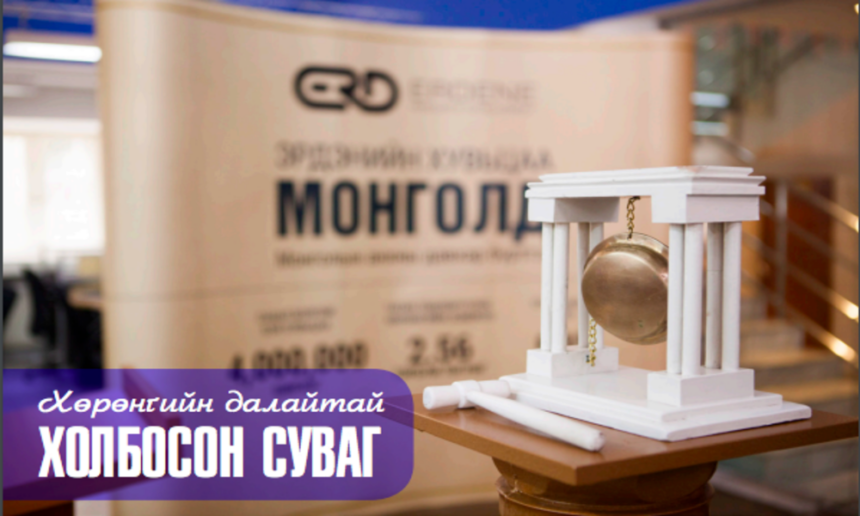It is widely believed that the great Giuseppe Verdi composed his popular opera Aida to celebrate the opening of the Suez Canal that connected the Mediterranean Sea with the Indian Ocean. Ever since, this canal has been playing an important role in the economic development of Europe.
It was announced at the Mongolian Stock Exchange (MSE) on Monday that the first canal to connect Mongolia with the sea of global capital was opened. After six years of preparation, Erdene Resource Development (ERD), which is listed on the Toronto Stock Exchange (TSX), became listed on the MSE. This means that ERD has become the first dual-listed company on the MSE, giving Mongolians an unprecedented opportunity to play on both domestic and foreign markets.
New way to find profits
There are two ways to find profits from stock exchange: 1) receive year-end dividends if they get distributed, and 2) buy shares when they are cheap and sell at higher prices. The sale of shares starts taking place with great effect when shareholders who learned about material information relating to the company decide to sell their shares or buy more. When a company is dual-listed, it allows people who own shares on both markets to make plays between the two stock exchanges because changes in share prices in one stock exchange influences the price on the other exchange. Also, when different currencies are involved, you could also base your buy or sell decisions on currency rates. You would also start thinking about the fact that when a new day begins in Ulaanbaatar, Toronto will see their stock exchange closed with the 12-hour difference between the two cities. Generally speaking, the TSX will likely be following the MSE.
For example, ERD was first listed in Canada in 2000, and has been conducting mineral exploration and development activities in Mongolia since 2002. Currently, they are prospecting for gold and copper ore, and have already discovered a couple of deposits (the Altan nar deposit with gold, silver, and zinc resources, and the Bayankhundii deposit with resources of 20-35 tonnes of gold). The company will soon start estimating the reserves of their first deposits, have them accredited by independent organizations, and seek special permits from the government. Therefore, any material information is more likely to be disclosed in Mongolia first.
Mongolians can now buy shares of this company through brokerage firms and start finding profits by buying and selling shares having identified price fluctuations. However, people need to understand that it doesn’t work like bank savings – shares can give you enormous returns on investment but you also face the risk of losing as much. It is just another economic freedom granted by the free market.
If ERD proves that being listed on the MSE is advantageous and allows for greater opportunity to attract capital, another 20 companies who are listed on foreign exchange markets but have their key projects in Mongolia would follow suit.
If that happens, more foreign people will start buying shares from the MSE, enabling a step-change in its maturity and boosting the overall market value. This will also lead to a new benchmark set on transparency and good governance of mining companies, which would incentivize Mongolians to put their money in the capital market rather than commercial banks.
Natural reduction in loan interest rates
As soon as there is an opportunity to raise capital on the MSE, large companies in Mongolia would start thinking twice before going to the bank to request loans. This would lead to less pressure on banks and ultimately reduce the interest rate of loans. It should then be followed by a decrease in savings interest rates, which would push people more to the capital market.
In countries where the capital market is well-developed, people buy shares using their own capital and, in turn, companies improve their governance and ensure transparency. When this happens, it doesn’t let the government to drastically impact the market, make unexpected decisions, and bring taxpayers to their knees. It will also push state-owned companies to be privatized, and make the government fulfil its duty to regulate, instead of owning businesses.
Now the government is prompted to support dual-listed companies by passing and implementing laws that protect the rights of shareholders.
Those companies that have projects running in Mongolia and are listed in international stock exchanges are all mining companies. Mining is the only sector that is attracting foreign capital in Mongolia. Up until now Mongolians were unable to directly invest in this industry.
Although the transparency in mining is getting better, the distribution of income is still unequal because the funds that are supposed to go to local communities as stated in the law are not going there. Therefore, people are looking increasingly unfavorably upon mining companies and have a stronger tendency to take an opposing view.
In order to protect the interests of local communities and boost their involvement, mining companies are making many different types of social investments on top of the taxes and payments to the government. However, the ERD shares becoming available in Mongolia allows people to see mining from a completely different perspective. This new perspective should allow Mongolians to cooperate with mining companies rather than suspecting them of misdeeds, bear risks together, and share profits together. It is a significant step to developing our mining-based economy.
The modest announcement that came from the MSE has gone around the world echoing the declaration that Mongolia has opened a new channel to global capital.
A new era beckons for the Mongolian capital market.
2018.06.06
Trans. by B.Amar












